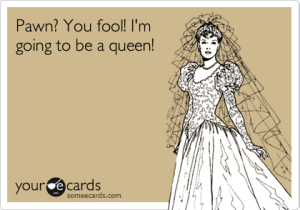Don’t Defame the Dead!
Welcome to Don’t Defame the Dead!: Nevill.
Elizabeth Wydeville – a commoner! – had the temerity to marry a king. And she is portrayed in all kinds of negative ways. Grasping; greedy; jealous; manipulative; spiteful… In one book. the Too Good to be True Heroine catches her mocking a fat servant (and that was before she married her king!) Now, I’m contractually obligated to hate the Wydevilles for the duration, but I’ve been give a day’s reprieve, so I’ll make the most of it. Edward IV was the one whose actions were dubious. He had no business (from the perspective that a king’s marriage was about more than personal choice, it was about politics, alliances and other stuff) marrying Elizabeth. A lifelong commitment might not have been his first consideration. So, what was Elizabeth supposed to do in that case? Say, “Oh, I’m far too lowly and humble to be your queen! Please, by all means, sleep with me for as long as you want, then walk away.” Or perhaps, “Oh, don’t worry about the wedding thing! I understand. Off you go. It’s been such fun!”
I can’t think of one book featuring the countess of Warwick where she is not in some way terrified of her husband. Strange, then, how she chose to be with him just about every second of their marriage. She went with him to Calais, though she is reported to have hated the place; she shared with him his last exile, arriving back in England on 14 April 1471 to the news that he was dead. Waurin reports (twice) that she greeted him with joy on his safe return to Calais.
It was a father’s duty to find the best marriage partners for their children. Best not just for their children but for the family in general. No child expected to marry for love. Warwick found a Duke for his elder daughter and a Prince of Wales for the younger. Advantageous to him, both of them, yes. But utterly advantageous to the young women themselves.
Hunchbacked, withered armed Richard III, anyone?
When forced to flee England in 1471, Warwick made sure his wife and daughters were with him. “Showing scant regard for his womenfolk” a lot of historians (and others) say. Leaving his family behind to be left in poverty, possibly homeless, potentially hostages, would have shown a good deal less regard for ‘his womenfolk’ (perhaps better to say his wife and daughters?) than collecting them, making sure all were together and hightailing it to Calais. I think this is mostly based on the Duchess of Clarence’s advanced pregnancy. But Warwick wasn’t to know he’d be kept out of Calais, nor was he to know that isobel would go into labour aboard ship to a deeply sad outcome. I can’t imagine a darker time for the family, burying a baby boy at sea. This was Warwick’s first grandchild, and to suggest he simply didn’t care is monstrous. Give the man a break!
The Wydevills weren’t the only ones tagged as ‘grasping’ and ‘greedy’, the Nevills are as well, particularly Warwick. He held a lot of well rewarded posts – Captain of Calais, Keeper of the Seas, Warden of the Cinq Ports, Warden of the Marches towards Scotland… And he worked hard at all of them, didn’t just sit back and wait for the cash to drop into the palm of his hand. Did Edward rely on him too much? Certainly at the start. But as time went on, he ended up relying on him too little. And that was a bad mistake.
Based on one report from Warkworth, John Nevill is forever branded as a man prepared to betray his brother. And yet he is lauded for that, treated like a hero. I don’t understand that at all. (I’ve blogged it.)
Susan Higginbotham says this better.
A couple of times during the Wars of the Roses, scurrilous rumours sprang up that Edward IV was not the son of the Duke of York at all, but an archer named Blaybourne. Tony Robinson and Michael Jones stirred the pot with their ‘documentary’ about it. A lot of people are convinced of the truth of it. The evidence for it is flimsy and circumstantial. The evidence against it rests on a number of things, not the least being the Duke of York’s treatment of this supposed archer’s son. “But he had a tiny little christening!” people say. “Not like his little brother Edmund!” So the Duke of York, faced with his wife’s illgotten offspring, puts his foot down. He would acknowledge the boy as his (he didn’t actually, there was no need), treat him like his son and heir, mark no difrerence between him and the other children, BUT… He wasn’t going to get a fancy christening! It’s nonsense.
There was a belief in witchcraft in the 15th century, and people did get accused of practicing it. Jacquetta Wydeville did, and was acquitted. So there’s no problem portraying characters who believe in witches, or even believe they are witches. But to actually endow them with magical powers? Pffff!
George Nevill’s enthronement feast as Archbishop of York is often cited as an example of excess: excess and oneupmanship. I’ve blogged it.
 Just a general plea: Don’t Defame Daddy! Marriage for love was not only uncommon bur greeted with shock or scorn in the 15th century. Daughters were more likely to be totting up their future worth when Daddy suggested young Lord So-and-So or the widowed and ageing Earl of Thing, Widowed and ageing might have its disadvantages, sure, but there was always wealthy widowhood to look forward to. Please don’t feel sorry for these non-21st century girls. Their husbands didn’t have much choice either!
Just a general plea: Don’t Defame Daddy! Marriage for love was not only uncommon bur greeted with shock or scorn in the 15th century. Daughters were more likely to be totting up their future worth when Daddy suggested young Lord So-and-So or the widowed and ageing Earl of Thing, Widowed and ageing might have its disadvantages, sure, but there was always wealthy widowhood to look forward to. Please don’t feel sorry for these non-21st century girls. Their husbands didn’t have much choice either!
And here are the ‘greedy’ ‘grasping’ Wydevilles. Looking after their own interests in the same way other, more established, families did. Some of it wasn’t nice, viz Anthony Wydeville’s treatment of Maud Stanhope, but he wasn’t inventing anything new there. Sure, people looked down on them, called them upstarts, moaned about how they were nicking all the good marriages. Unless one of those good marriages went in their favour – a connection with the king wasn’t to be sneezed at.
“You’re going to marry the Prince of Wales.” “But I don’t love him, Papa!” or “You’re going to marry the Duke of Clarence.” “But I don’t love him, Papa!” Actually, there’s every reason to think that, by the time of their wedding, Isobel Nevill and the Duke of Clarence were more than happy with the marriage, from a personal perspective as well as the usual. Her father seems to have given them the opportunity to develop a friendship, if nothing else. As for Anne’s marriage to a Prince of Wales! One whose exile Daddy was working hard to bring to an end, one who Daddy was going to do everything he could to restore to his birthright. Yes, these marriages were advantageous to Warwick, but all medieval noble marriages were meant to be that. Please, stop calling them pawns.
Guess who says this better?
Weak, pale, fragile, DOOMED Anne Nevill… She’s in all the books. There’s no evidence of her in real life. So sad that she died so young, and Isobel as well, and so sad that her only son died even younger. People did. They died young a lot. It’s why we have the myth that ’60 was seen as ancient’. It wasn’t.
I’ve seen Warwick described as ‘a notable failure as a general’. His thinking was certainly a little too defensive at times – like 2nd St Albans – but just think how he’d be hailed now if he’d got the line of the enemy army’s advance right! A military genius! Innovative with defences! He wasn’t the finest general during the Wars, but he wasn’t a military dunce, either.
This is Alice Montacute, Countess of Salisbury. And, yes, she really did look like that! I’ve seen her portrayed as a helpless whimpering swooning nellie, her part in the Wars ignored, her attainder given to someone else, and I STILL DON’T KNOW WHY! Women’s history is ignored enough without this kind of nonsense.
I’ve seen it in novels, suggested in serious works of non-fiction, listed as fact in material for the study of history. And it’s not only not supported by the sources, there’s clear evidence that the contrary applied. The Duke of Clarence grieved deeply when his duchess died. He went off the rails. Yes, he’d done some dumb things in the past, but if there’s no evidence that a man was a hopeless drunk who physically abused his wife, why say it?
The Countess of Warwick was stripped of her lands and titles after her husband’s death at Barnet. Illegally. She wasn’t ‘rescued’ by her son-in-law, the Duke of Gloucester, and taken to live a life of ease and comfort in ‘her favourite castle’. The burden of taking care of her wealth and lands wasn’t gently eased from her helpless trembling hands. She was Countess of Warwick in her own right. Neither she nor her husband were attainted for treason. She really was declared dead in parliament. This was an illegal act. Turning it into a kindness is (I’ve used this word a couple of times, I think) nonsense.
And maybe this is what we all need to remember!
Please don’t forget to visit Don’t Defame the Dead!: Edward II.
The cards were created here: http://www.someecards.com/

























